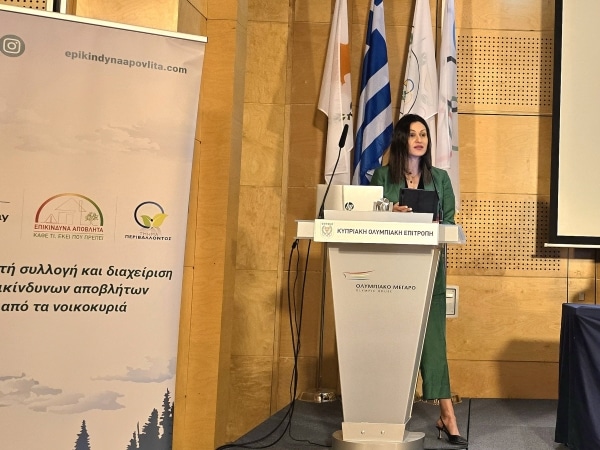The great importance of the separate collection and management of hazardous waste both for the environment and for the quality of life of citizens, was emphasized today by the Minister of Agriculture, Rural Development and Environment Maria Panagiotou.
In her greeting at an event at the Olympic Palace for the closing and presentation of the results of the Project "Separate collection and management of hazardous waste from households", the Minister first said that events such as today's emphasize the vital importance of waste management and underline the importance of separate collection of hazardous household waste.
At the same time, he said, they highlight the necessity to create a new philosophy and culture in public opinion regarding waste management, which, although it is a challenge, paves the way for a better, sustainable future.
Ms. Panagiotou stated that waste is not just garbage that must end up in landfills but is a natural resource that, if recovered and recycled properly, can be turned into raw materials.
He emphasized that on the other hand, hazardous waste, such as chemicals, electronics, batteries and pharmaceutical products, pose serious risks and in one way or another return to our body, since they have managed to disturb the natural balance, have poisoned fauna and flora, have affected our quality of life.
"So whatever we throw to the earth, dear ones, comes back to us. It is for this reason that projects such as the "Separate Collection and Management of Hazardous Waste from Households" to inform and raise public awareness, are the first step towards achieving the goal of a comprehensive transition to a Green Development and Circular Economy. A priority, which is also included in the Governance program of Nikos Christodoulidis", he said.
As the Minister mentioned, the project, with a duration of implementation of 39 months, was implemented by the Department of Environment, in collaboration with the Development Company of Nicosia, and with the Managing Authority the General Directorate of Development, its financing was from the Norwegian Funds 'Norway Grants Programming 2014 -2021', with a budget of €500.000.
Its purpose was, as he noted, beyond raising citizens' awareness of the effects of improper waste management, and informing them of the obligation of separate collection of hazardous waste from households, which begins on January 1, 2025 - that is, in about 7 months.
Ms. Panagiotou underlined that as part of the Project, four towed mobile units were built, which acted as mobile collectors, but also as information units, which visited 135 local authorities, i.e. 91 Communities and 44 Municipalities. This was achieved, he said, over a period of five months, starting last October.
He added that the number of primary and secondary schools he visited in each unit is important.
Ms. Panagiotou emphasized that the goal is to continue this effort with national or other resources after the completion of the project. "This will be achieved through visits of the existing four mobile units to Municipalities and Communities, while our goal is to increase the number of units, mobile and fixed, for even more results. In addition, the new collective system of extended responsibility of the producer for the waste of pharmaceutical products of domestic origin is expected to be licensed", he said.
At another point, Mrs. Panagiotou pointed out that the contribution of the Local Authorities is essential and the role that the Municipalities and Communities have to play is important, both in terms of informing and raising awareness of the local society and in the correct implementation of the legislative framework for waste management.
Concluding, the Minister invited the citizens of Cyprus to actively participate in building a greener tomorrow, through and through the proper implementation of the separate collection of hazardous household waste.
